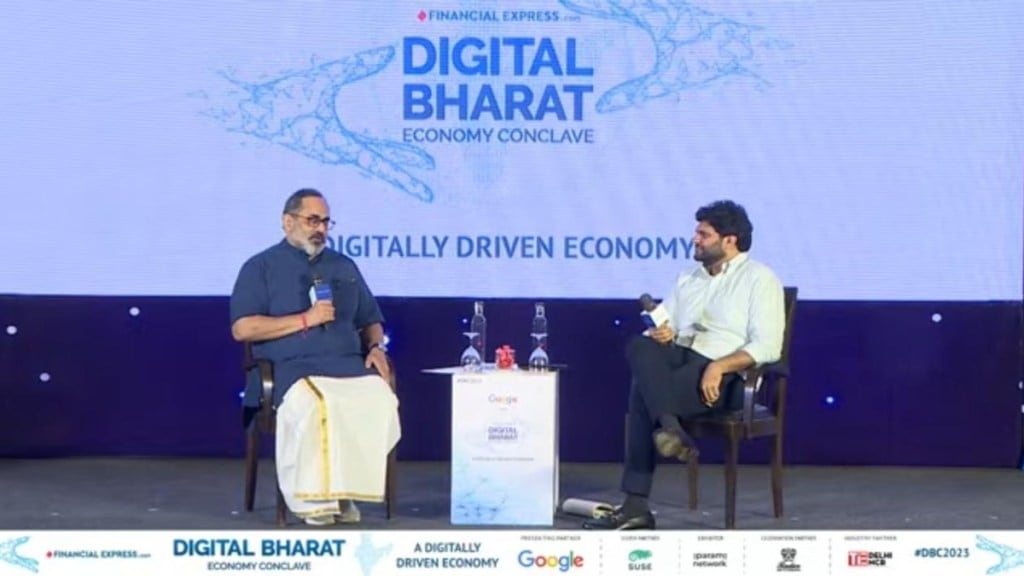Big Tech firms require more oversight from governments across the world because of the abuse and misuse of power that they often exercise, following a particular political ideology, Rajeev Chandrasekhar, minister of state for electronics and information technology, said on Wednesday.
The minister’s remarks come in the context of Twitter co-founder and former CEO Jack Dorsey’s recent statement that the Indian government threatened to shut down the micro-blogging site for not taking down or blocking accounts critical of the government during the farmers’ protest. Chandrasekhar has termed Dorsey’s comments as “an outright lie”.
Chandrasekhar, who was in conversation with The Indian Express Group’s executive director Anant Goenka at financialexpress.com’s Digital Bharat Economy conclave, said in fact, Twitter was in violation of Indian law for a period of two years. “But the government neither shut it down, nor did it jail anybody, and even did not impose punitive consequences on the platform.”
“All we are interested in is that the company should comply with the laws of the land,” Chandrasekhar said.
Talking about Twitter’s history of treating the country’s law with contempt, the minister said, “With Twitter in specific, two things that are there in public domain now is that they believe that they were a sovereign entity and therefore laws of any nation did not apply to them. We swiftly disabused them of that. Second, the Twitter files expose that we have seen in early 2023 and late 2022, reinforces the need for governments all around the world, including in India, to have very clear guardrails, and do’s and don’ts for it.”
Chandrasekhar’s comments come at a time when the government is drafting the Digital India Act to deal with the changes in the technology world. The sector is currently regulated by the 23-year-old Information Technology Act. As part of the new Act, the government is also thinking on amending Section 79 of the Information Technology Act (safe harbour provision), under which the social media companies enjoy immunity against the third-party content on their platforms. “Safe harbour rules are very ancient. It’s from the time when Internet was just about dumb pipes connecting the consumers and what went through it was nobody’s concern. Today it’s not the same, so the rules need revision,” he said.
Chandrasekhar said that apart from regulating Big Tech companies and different intermediaries under the upcoming Digital India Act, the government is also looking to regulate emerging artificial intelligence technologies through the prism of user harm.
“We are trying to create a framework that other countries can follow as well. The world is looking to India’s leadership simply because we are the largest connected nation and we are in a way approaching this (the regulations) in a correct manner,” Chandrasekhar said.
On the recent data breach and links with CoWIN, Chandrasekhar once again emphatically said that the breach was not related to the CoWIN portal. He said a large part of the leaked data was fake and the investigation is going on to check if it was a deliberate attempt to mimic a breach.
“I just want to explain how easy it is to mimic a breach. While Cert-In is still investigating, we believe that the database, the Telegram Bot was throwing up the data from, was the database owned by the person who owned the Bot,” Chandrasekhar said
“Assuming for a minute that there is some real data in that. Everybody will agree that Aadhar data had been breached pre-2014 repeatedly. So how old the data is, where did the data come from, how much of it is false and fake, the investigation will tell,” Chandrasekhar said, adding that the probe will be made public.
On a question about US maintaining its lead in terms of bringing out emerging technologies, and whether India would be able to match the same at some stage, Chandrasekhar said, “Silicon Valley is still an innovation hotspot and nobody can take that away from it. But we can try and be a competing destination for innovation.”
“Our digital economy as a percentage of GDP was about 4% in 2014. We are close to 10% today. By 2026, the digital component will be 20% of the GDP. So certainly, Digital India will lead India,” Chandrasekhar added.
On India’s startup ecosystem, Chandrasekhar said valuation corrections will always happen but the trend suggests a consistent growth of the digital economy. Startups in the AI and semiconductor space are currently getting traction from investors, he said.
